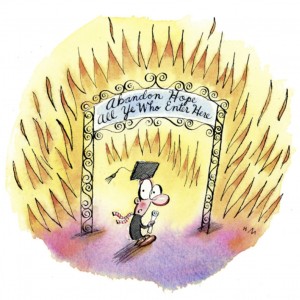[caption id="attachment_367" align="aligncenter" width="300"] Image Credit: Hal Mayforth[/caption]
Image Credit: Hal Mayforth[/caption]
Shelley Sandiford has written an article on nextscientist.com encouraging upwards of 90% of PhD students to leave academia before doing a postdoc. This article actually goes through several scenarios in which student A is contrasted with student B, lab A is contrasted with lab B, and research project A is contrasted with project B. Both student A and student B are assumed to wish to become academics, but only student A has any chance whatsoever, albeit only a slim chance. The article is somewhat cynical, but contains some issues worth considering during your pursuit of a doctoral degree. There are also flowcharts (suitable for framing on your cubicle wall) at the end of the article to make your decision to leave academia easier! Hey, thanks!
Here’s a quick summary of the article: Although we all want to be academics, there are exactly three criteria that you must meet to do so:
1) You work on a project that flows nicely from previously published work and is fruitful in a reasonable amount of time (as opposed to a “fishing expedition”);
2) You’re in a lab that works together harmoniously and is well-published (as opposed to a “toxic lab”);
3) You and your advisor have great reputations, give many invited talks, and successfully receive funding early and often (as opposed to not getting funding or talks).
Oh yeah, and in addition to the three criteria:
4) You must be in the top 10% of your class in grad school;
5) And you must have amazing project management skills.
If you don’t meet these criteria, you are “Student B” and should leave academia before doing a postdoc, which will simply delay your “inevitable exit from Academia.”
Even if you are “Student A” and you are a candidate for staying in academia, you may still be destined to become a woeful “permadoc,” a soulless spirit, doomed to haunt the lab bench for eternity, trapped in scientific purgatory. (You may have noticed from my previous post that this term is one of my pet peeves! I respect those who choose such positions for their own reasons and think they are much maligned.) “If Student A is still in for a rough ride beyond their PhD, understand that Student B’s chances are nil.”
Dr. Sandiford asserts, Student B isn’t doomed: Outside of the Ivory Tower, Student A and Student B are on a level playing field. In fact, some hirers would prefer Student B, who is “less likely to feel entitled, more likely to work well with others…”
One of the premises of the article is that everyone getting a PhD aspires to remain in academia—a premise that is surely false. In fact, the lucky, smart, and talented Student A might have dreams of guiding big pharma to develop and deliver new treatments to patients in need, or starting a biotech to create clean, renewable energy technologies.
Part of the process of getting a PhD in Life Sciences is learning when to recommit to a project and when to abandon it. Success in science relies on this skill, because all of us begin projects that are not viable. Since so much of science is failure, it is essential to get a realistic sense of when to push harder for a project to succeed and when to abandon ship.
Therefore, at its base, this article is about doing this cost-benefit analysis—something we have done perhaps a dozen times by the time we receive a PhD—only this time, the “experiment” is our career. OK, I agree that we should be honest with ourselves about our strengths and weaknesses. However, I would argue that the essentials that Dr. Sandiford proposes are not the only rubric for such decisions. After all, don’t we all have different joys and aspirations? I know current Principal Investigators who earmed PhDs in toxic labs. I also know some who struggled through one failed project after another to eventually excel and find faculty positions.
The article is certainly thought-provoking, but I’m having a hard time deciding whether Dr. Sandiford’s article is helpful or too bleak. On one hand, it certainly behooves each of us to think hard about what life will be like as an academic postdoc and beyond. But what about being honest about our desires and aspirations? About what makes us happy? And what about strength of character and perseverance?
What do you think? What factors or feelings will guide you to stay or leave academia? Please feel free to share your thoughts in the comment section.